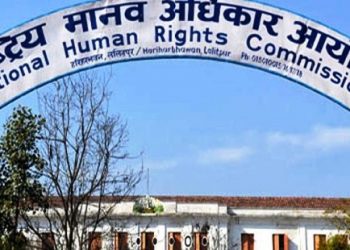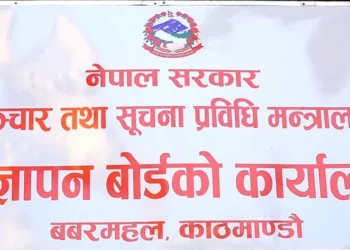KATHMANDU: The Nepal Rastra Bank (NRB) has announced that the current Rs 60 billion refinancing fund would be increased in near future to manage capital to mobilize in the coronavirus-affected businesses.
“The central bank will amend the Refinancing Procedures to mobilize the facility efficiently to the COVID-19 affected areas, including small and medium enterprises (SMEs) and tourism,” said NRB Governor Maha Prasad Adhikari in a speech delivered on the occasion of 63rd Anniversary of the bank.
He said that the provincial balance would also be maintained while leveraging the refinancing facility.
According to Adhikari, concession would be granted in the interest of fourth quarter payment of loan in the current fiscal year and additional measures would be applied to simplify the process of bank loan mobilisation.
“Arrangements would be made to facilitate the loan that needed to be paid during the lockdown period to pay later. Highly affected sectors will have easy current capital loan facility,” he said.
He pledged his commitment to mobilise enough financial resources to the economic sectors like infrastructure, SMEs, agriculture, energy and tourism in order to enable them to develop resilience and revive in the time of crisis created by the coronavirus pandemic.
Saying that even the developed countries are in a situation of confusion and uneasiness due to the sudden outbreak of the deadly virus across the world, Adhikari noted that banks and businesses in Nepal should move ahead with caution. “This is a hard time but the central bank is committed to maintain economic stability by expanding the economy and reducing the impacts of the pandemic on tourism, trade, foreign employment, financial sector and infrastructure development,” he said.
In case of Nepal, the crisis has directly affected the high-growth trajectory that the country was witnessing for the last three consecutive years.The central bank has already announced 10 per cent discount on bank loan interest and the payback period has been extended up to the end of the current fiscal year.
Likewise, it has slashed the compulsory capital reserve ratio and bank rate, stopped the provision for countercyclical capital buffer, and announced priority to the health institutions and facilities in loan facilities if they wanted to extend and expand the facility and services.
Similarly, the banks and
financial institutions can count the monetary contributions they made to the federal and state-level coronavirus treatment fund as the corporate social responsibility (CSR).
The NRB has also waived off the charge of electronic payments in order to facilitate and encourage people to make financial transactions during the lockdown period.
Adhikari said that the reduction in paddy production and impact of coronavirus on tourism, transportation, construction and industries would affect the economic growth. It is also likely to increase the cost and time of the development projects.
According to him, the financial reach has expanded to 746 local bodies out of 753 with 9,692 branches of 162 banks and financial institutions. Commercial banks have 4,218 branches, development banks 1,216, finance companies 239 and micro-finance institutions 4,019 branches across the countries. One branch is catering to about 3,055 people.
Also, there are 1,585 branchless banking and 3,945 ATMs across the country. The BFIs have 31.7 million deposit accounts and 1.5 million borrowers.








Comment